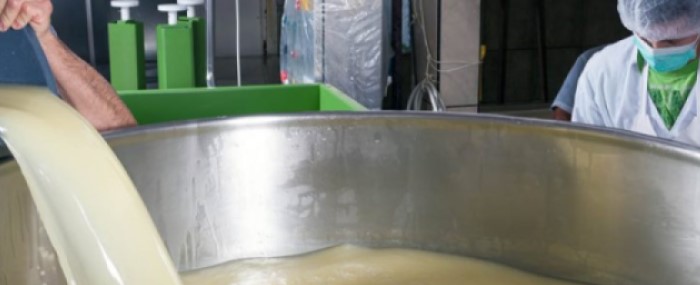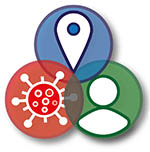
Food manufacturing: a high-risk environment for COVID-19 virus transmission?
Free online seminar: 1.00-2.30pm, 3 March 2022
In the early stages of the pandemic, food manufacturing facilities – especially meat processing plants – came to be seen as a particular cause of concern, with a number of major outbreaks of the COVID-19 virus reported to be associated with them.
There has been conjecture as to if and why food manufacturing may present a particularly high-risk environment for transmission of the virus, and what other factors may be at play.
This free online seminar, presented by the PROTECT COVID-19 National Core Study on transmission and environment, will explore whether these concerns are borne out by the evidence, assessing risk factors and mitigations in the sector, investigating outbreaks and identifying lessons learnt.
This event will be of interest to those working in and around the food sector, including business, workers, trade associations and unions, as well as relevant government policymakers, occupational and environmental health professionals, and researchers.
Chair: Professor Andrew Curran, Chief Scientific Adviser, Health and Safety Executive
Speakers and presentations:
- Dr Yiqun Chen, Science Hubs Lead on The Right Evidence for the Future, Health and Safety Executive – COVID-19 outbreaks in the food manufacturing sector. View a pdf of Dr Chen’s presentation
- Dr Barry Atkinson, Senior Virologist, and Rob Johnston, Out-Posted Food, Water and Environmental Scientist, UK Health Security Agency – Environmental surface sampling for SARS-CoV-2 in food manufacturing workplaces. View a pdf of Dr Atkinson’s and Rob Johnston’s presentation
- Dr Miranda Loh, Head of Environmental and Public Health, Institute of Occupational Medicine – An interdisciplinary examination of risks and experiences of COVID-19 in the food and drink manufacturing sector. View a pdf of Dr Loh’s presentation.

Dr Miranda Loh is Head of Environment and Public Health at the Institute of Occupational Medicine, with expertise in methods for exposure assessment in epidemiology and health risk studies. She has experience with both environmental and biological monitoring and exposure modelling in various UK Research and Innovation and European Commission funded projects. Her areas of research include personal level exposures to indoor and outdoor air pollution, and effectiveness of facemasks and other interventions in protecting against exposure to particles and other pollutants, as well as measuring the COVID-19 virus in the environment and the risk of its environmental transmission in the workplace. She has worked on projects all over the world including China, India, Thailand, and Kenya.
Barry Atkinson is a Senior Virologist at the UK Health Security Agency (UKHSA). Barry has spent nearly two decades researching high- consequence viral diseases including developing frontline diagnostic assays for multiple haemorrhagic fever viruses and arboviruses. His work at UKHSA has also involved outbreak response efforts for incidents such as the 2009 influenza virus pandemic, the 2013 West African Ebola virus outbreak, investigating imported cases of high-consequence pathogens such as monkeypox virus, and multiple outbreak investigations following cases of Anthrax in the UK. Barry’s current work focusses on understanding the transmission potential and survivability of SARS-CoV-2 in the environment and investigating workplace outbreaks of COVID-19.
consequence viral diseases including developing frontline diagnostic assays for multiple haemorrhagic fever viruses and arboviruses. His work at UKHSA has also involved outbreak response efforts for incidents such as the 2009 influenza virus pandemic, the 2013 West African Ebola virus outbreak, investigating imported cases of high-consequence pathogens such as monkeypox virus, and multiple outbreak investigations following cases of Anthrax in the UK. Barry’s current work focusses on understanding the transmission potential and survivability of SARS-CoV-2 in the environment and investigating workplace outbreaks of COVID-19.
Rob Johnston is an Out-Posted Food, Water and Environmental Scientist at the UK Health Security Agency (UKHSA), and has worked for UKHSA and its antecedent organisations for over 20 years. In this role he provides advice and support to UKHSA Health Protection Teams, local authorities, the Health and Safety Executive, the NHS and other organisations on food and water borne organisms of public health significance, the management and control of such organisms, and sampling practices and procedures. He has worked on sampling activities in Africa and delivered training in the UK and across Europe. Prior to this, Rob’s early career involved working within Environmental Health Services at three local authorities, having trained with Wirral Borough Council and qualified as an Environmental Health Officer in 1987.
for UKHSA and its antecedent organisations for over 20 years. In this role he provides advice and support to UKHSA Health Protection Teams, local authorities, the Health and Safety Executive, the NHS and other organisations on food and water borne organisms of public health significance, the management and control of such organisms, and sampling practices and procedures. He has worked on sampling activities in Africa and delivered training in the UK and across Europe. Prior to this, Rob’s early career involved working within Environmental Health Services at three local authorities, having trained with Wirral Borough Council and qualified as an Environmental Health Officer in 1987.
Dr Yiqun Chen is an Epidemiologist and a Science Hubs Lead at the Health and Safety Executive (HSE). She is currently the technical lead for Theme 1 (Outbreak Investigations) of the PROTECT COVID-19 National Core Study. Prior to joining HSE in 2010, Yiqun worked at the University of Manchester for 11 years, managing a national surveillance system for work-related ill health based on clinical specialists’ reports. She also worked in Canada and Australia for five years, managing provincial and state level cancer surveillance programmes, and led the cancer cluster investigation in a remote aboriginal community in Alberta, Canada. She has a bachelor’s degree in Clinical Medicine and a PhD in Occupational Health Epidemiology.
lead for Theme 1 (Outbreak Investigations) of the PROTECT COVID-19 National Core Study. Prior to joining HSE in 2010, Yiqun worked at the University of Manchester for 11 years, managing a national surveillance system for work-related ill health based on clinical specialists’ reports. She also worked in Canada and Australia for five years, managing provincial and state level cancer surveillance programmes, and led the cancer cluster investigation in a remote aboriginal community in Alberta, Canada. She has a bachelor’s degree in Clinical Medicine and a PhD in Occupational Health Epidemiology.






0 Comments